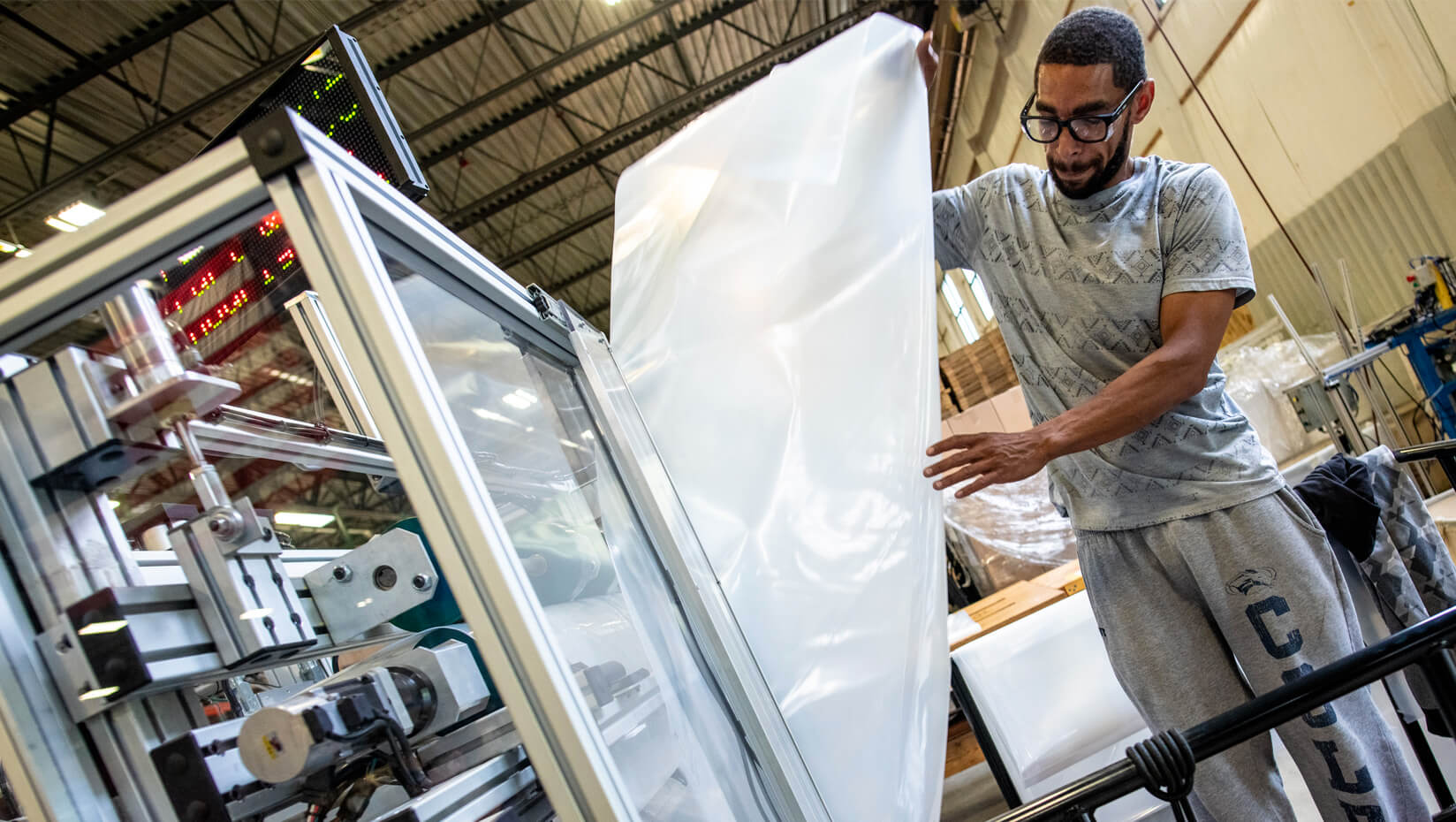
AMC partners with Maine container manufacturing company PackGen to increase production efficiency, contribute to state economy
“None of us is smarter than all of us,” reads a sign above the door to the office on PackGen’s manufacturing floor.
For PackGen, a company based in Auburn, Maine that specializes in making industrial shipping containers, it’s all about the people who make a difference in the process, from sparking ideas to manufacturing products to bringing them to market for clients.
And focusing on collaboration is just what the company has done by working with the University of Maine Advanced Manufacturing Center (AMC) and Maine Manufacturing Extension Partnership (Maine MEP) collaborative, a resource for small- and medium-sized manufacturers that helps them become more efficient, productive and globally competitive. The AMC promotes economic development in Maine by connecting engineering faculty and students with businesses and industry. Within this role, the AMC also supports Maine MEP projects like PackGen.
PackGen “made its claim to fame” by incorporating rigid materials with flexible materials to make lightweight, collapsible containers, according to John Lapoint, president of PackGen. The company serves niche markets worldwide, including those in the environmental, mining and refining industries.
PackGen built all the machines needed for product manufacturing. But as the company grew and production volume increased, maintaining weld consistency container liner construction became increasingly difficult.
AMC and PackGen connected through Lapoint’s brother, Alan, who owns the filtration business The Strainrite Companies, also based in Auburn and an AMC collaborator. PackGen partnered with AMC to design and build an improved, automated welding machine for making container liners.
PackGen’s original process required two people and two separate machines, and was time-consuming. AMC’s redesign allows the same process to be conducted by one person, and produces more liners in less time.
“What we were trying to do is improve the quality and reduce the labor. With this new piece of equipment, we’ve been able to achieve that,” says Lapoint.
Besides increasing production capacity, the new machine also reduces physical strain on the operator by automating most of the process, allowing that employee to focus on inspection and quality control. In addition, the process now requires just one type of source material instead of two, the result of an improvement to the structural design of the liners.
“The results were a completely configurable, interactive automation machine that reduced cycle time to 20 seconds, increased capacity and runs with one operator,” says Forest Wentworth, Maine MEP project manager at AMC. “The liner machine increased the available capacity for PackGen, allowing them to pursue more orders, increase profit and keep Maine folks employed.”
The new machine was created in part by Bradley Denholm, an electrical engineering student at UMaine, who was responsible for designing and programming its control system. Denholm has been able to work on many projects for Maine businesses like PackGen, helping them improve contributions to the state’s economy while also gaining career experience before graduation.
The machine AMC built has been at the Auburn facility since March. Already it has made a notable difference in production output. And it’s just the first step in an ongoing partnership.
Lapoint says there are a number of benefits to working with UMaine. “I’m looking to hire, so seeing potential engineers working on a project gives me a chance to collaborate, see them in action, see their intellect, see their problem-solving skills, and so on.”
PackGen is founded on a strong team atmosphere. So Lapoint looks to employ people who can keep that spirit alive.
“We are a good company and we care. And so we want the same type of people working in this organization that care and have the right attitude,” Lapoint says.
Another benefit of the PackGen-AMC partnership, according to Lapoint, is that it enables the company to stay competitive in a global market by solidifying its Maine roots and its connections to the state’s economy. The partnership, in turn, benefits UMaine.
“It gives the university exposure to private industries that may be hard to reach otherwise through word-of-mouth,” says Wentworth. “At the same time, our students get a real-world engineering experience and can take pride in knowing this machine ultimately puts food on a lot of Maine folks’ tables by keeping them employed.”
PackGen and AMC are continuing to work together on improving the liner machine efficiency and output, with a goal of increasing the machine’s run time capacity to cover a full shift on the floor.
“What they’re working on has a lot of potential for us,” Lapoint says.
Other individuals from UMaine involved in the project for PackGen were John Belding, AMC director; Allen Treadwell, AMC electrician; and students Ryann Lindsey, Dominic D’Angelo, Aaron Dalhman and Duncan Blanchard.
Contact: Cleo Barker, 207.581.3729
